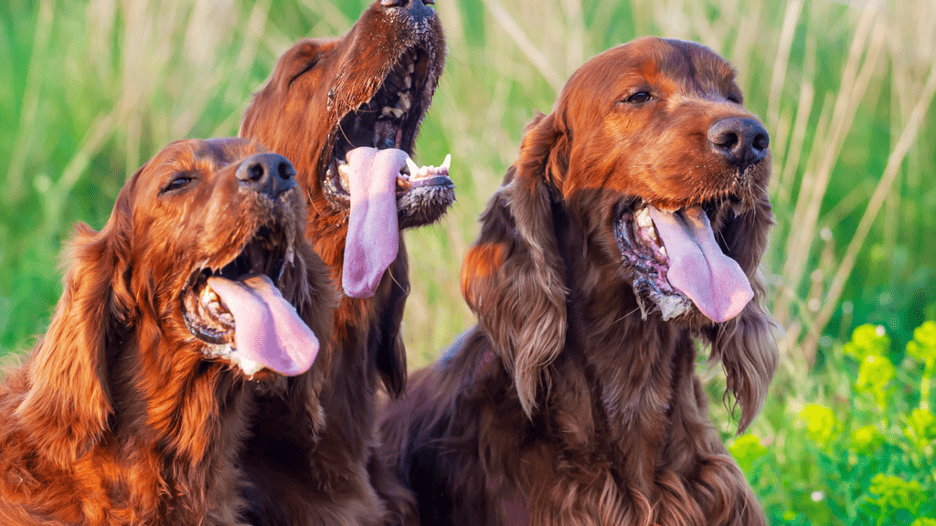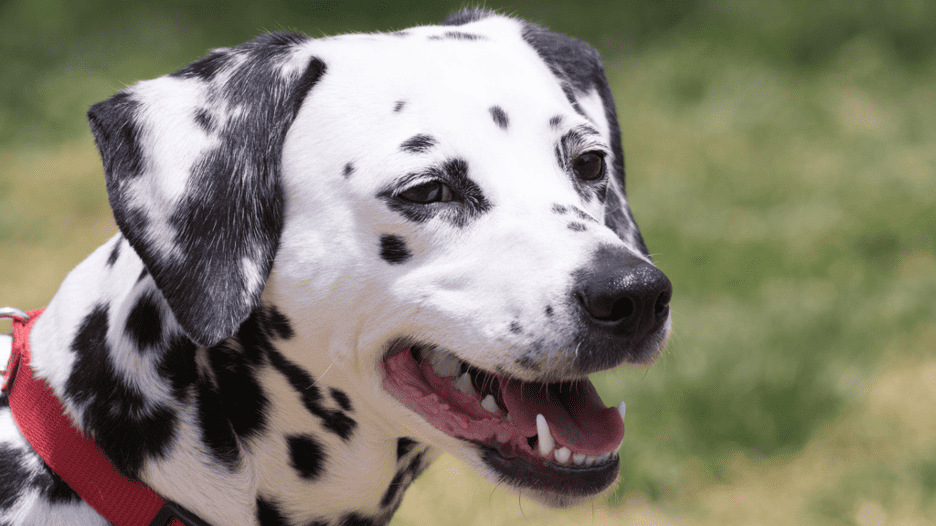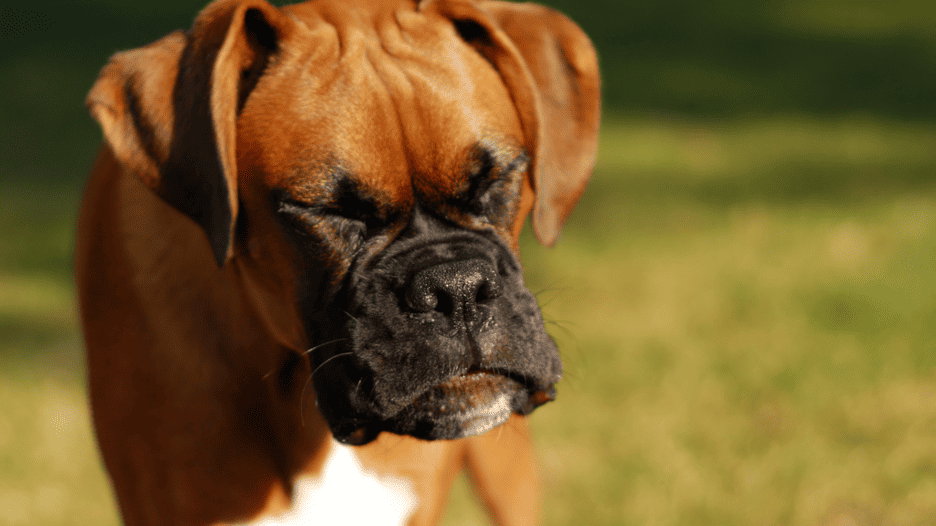Why is My Dog Panting So Much For No Reason?

We at Odie Pet Insurance know how important your pet’s health is to you. It is important to us too! We want what is best for your pet as much as you do! Being fur parents, we are always aware that our pet is doing something unusual. Excessive panting in a dog is one thing that you may be concerned about. We will chat about common causes, the difference between normal and abnormal panting, the underlying causes, and what we can do to try and fix it.
What is Panting in Dogs?
When your dog pants, it entails moderate to rapid open-mouthed respiration. This can be a normal behavior for dogs and puppies. Panting helps lower your dog’s temperature. It also gets oxygen into your dog’s bloodstream. You will see panting signs, such as your dog’s mouth opening and tongue protruding slightly. Panting can be a normal behavior for your dog, or it could also be a signal of an underlying medical issue. Panting can sometimes be confused with labored breathing. So, how will you know if it is a sign that something is wrong? Let’s talk about some of the causes of panting.

What Causes a Dog to Pant?
Heat can be a common cause of a dog’s panting. Since they can’t sweat like humans do, they use panting as a cooling mechanism. While panting, your dog can rapidly inhale, humidify, and exhale the air. This exhaling increases the evaporation from your dog’s nose and lungs. This water evaporation process helps cool your dog’s body from the inside out. Water in large amounts can be evaporated quickly, so we need to always ensure we have fresh cool water for our doggies on hot days! Here are some other reasons your dog may start panting.
- Exercise – Exercise with our dog is healthy AND fun. Whether you are walking, jogging, or hiking with your pup, it can cause them to pant. If you love to hike with your canine, check out these 7 great tips! How long should your dog pant after exercise? It can depend on your dog’s breed, athleticism, weight, muzzle length, and age. If you have an older or out-of-shape dog, they may pant for longer. Approximately 10 minutes is the duration of healthy panting for recovery. If your dog is not used to exercise, ease them just like you would. If your dog is overweight, they already have an additional strain on their cardiac and respiratory systems. You may want to discuss a weight loss plan with your vet. The temperature outside also plays a role. The hotter it is, the longer they may pant.
- Pain – Learning how to know if your dog is in pain is not always easy. Check out this helpful blog on how to recognize when your dog is in pain. Dogs are known for being stoic and may even hide obvious signs of pain. Panting can be indicative that they are in pain or even nauseated! Panting in pain might look different from normal panting if it goes on for longer than 15 min, occurs when the dog is seemingly rested, well-watered, cool, etc., and may be accompanied by other signs of pain like whining or whimpering.
- Stress and Anxiety – Pets are more like us humans than we even think! Did you know your dog could become stressed or anxious? When they experience these emotions, it is common for panting to occur. Some instances that could cause stress and/or anxiety in your dog include visiting the vet, riding in a car, bad weather, fireworks, or any other stressful event. The more common reason is being away from you! They miss us just like we miss them! We can do certain things to help prevent separation anxiety.
- Overheating (Heatstroke) – Heatstroke is when your dog is unable to cool itself down. It can cause breathing rates to be elevated or dry/sticky gums. Your doggie may appear lethargic or disoriented. In severe cases, they may even have a seizure! If you think your dog has heatstroke, you should move them to a shady, cool area. Immediately pour cool (not cold to avoid shock) water over your dog. We don’t want to use wet towels because, believe it or not, this can worsen the condition because they trap in the heat. You’ll want to allow your dog to drink small amounts of water. Keep up with pouring the cool water until they stop panting, but don’t overdo it, as this can cause shivering. Avoid pouring cool water onto the dog’s head during your treatment. This is because the dog may accidentally inhale some of the water, which could lead to drowning! This is especially relevant if your dog is a flat-faced breed or, heaven forbid, has lost consciousness. We recommend taking the dog to the nearest vet once the dog has cooled. Heatstroke is an urgent matter! This is the major reason to NEVER leave your dog in a hot car!
- Medications – Certain medications that your vet may have prescribed can cause panting, such as steroids, benzodiazepines, opioids for their pain, or a thyroid medication. Always talk to your vet if you feel your dog is not responding well to any given prescription.
- Anemia – If your dog has been diagnosed with anemia, you may notice some extra panting. Anemic dogs have a lower red blood cell volume which can lead to lack of oxygen around the body. Panting is a way to speed the oxygen intake.
- Cushing’s Disease – If your dog has been diagnosed with Cushing’s Disease, panting is one of the side effects. Common in senior dogs, Cushing’s occurs when your dog’s body has too much cortisol built up in its bloodstream.
- Laryngeal Paralysis – This is a condition where your dog’s windpipe fails to open correctly. Instead of opening normally, the sides of the windpipe are sucked into the opening. In severe and rare cases, this can cause suffocation. Treatment is available from your vet if it is caught early.
- Lung (Respiratory) Issues – We already talked about laryngeal paralysis, but other respiratory problems, such as pneumonia and lung tumors, could cause your pup to pant.
- Heart Issues – Of course, we never want anything to be wrong with our pets, but certain heart conditions could cause the need for your dog to pant. Panting or heavy breathing could be a result of heart disease or, more seriously, congestive heart failure.
We have covered most of the reasons your dog could be panting. Let’s not forget excitement! When our dog sees us, he may start panting out of pure joy. Regular playing, discomfort, high fever, or a very full tummy can also lead to panting.

How You Can Determine Whether Your Dog’s Panting is Normal or Not
We have discussed the causes, both normal and abnormal. But just how can we tell if the panting is abnormal?
Pay Attention to Your Dog’s Behavior
We spend a lot of time with our dogs, so we know what they are “normally” like. If extreme panting starts suddenly, won’t stop, or is accompanied by coughing or wheezing, you may want to take him to the vet. These vet visits are when Odie Pet Insurance can really come in handy.
Keep an Eye Out For Other Symptoms
As mentioned above, coughing or wheezing, especially when sleeping, is a cause for concern. If your dog isn’t acting like themselves, such as being lethargic, not eating or eating less, being aggressive or too passive, bloating, and vomiting are other worrisome issues. Take your dog to the vet A.S.A.P. if you suspect something is wrong.
Take Notice of Any Alterations in Your Dog’s Panting Sounds
If your dog is wheezing, panting harder, or has soft breath sounds that are uncustomary to how they normally pant, you may want to take her to the vet. Any difference at all in the way, sound, and time your dog pants are all red flags.
If You are Not Sure Why Your Dog is Panting
If you have even the smallest amount of wiggle room for concern, you should play it safe and take your dog to the vet. Vet visits can get pricey, so having Illness & Injury Coverage from Odie makes sense. It helps with the sting of hefty vet bills. Always be cautious and bring your dog to the vet if their behavior seems out of the ordinary, not just panting.
FAQs
- How Long Should a Dog Pant After Exercise? While each dog is unique, and factors such as body weight, breed, temperature, and duration of exercise come into play, the average time your dog should pant is ten minutes.
- Do Dogs Pant When They Are in Pain? The simple answer is sometimes. Unusual panting could be a sign of pain or distress in your pup. Look for other behavioral changes as we chatted about above as well. If you are unsure, please go to your vet. We don’t want our little guys suffering.
- Do Dogs Pant When Stressed? Yes. Things we talked about above, like separation anxiety, new people or surroundings, other dogs or pets, being startled, or anything new that might stress out your little one, could cause your dog to pant.
- If Your Dog is Panting 30 Minutes After a Walk – We know the average panting time after exercise is approximately ten minutes. If your dog is still panting after 30 minutes, something else may be going on. You don’t want to delay getting your dog to the vet, even if you think the panting could be because of extreme heat or weight. This could just mean a visit to Televet, a wonderful option Odie Pet Insurance offers, to describe symptoms and make a plan rather than rushing the dog to the vet.
- How To Stop a Dog From Panting – Depending on the cause of the panting will provide the solution. For example, removing a dog from a stressful situation can stop anxiety panting. Helping your dog cool off after overheating would resolve that issue. If the panting is chronic or new, make a vet appointment.
- Do Huskies Pant A Lot? Yes. Huskies pant to cool off. They have that super thick layer of fur. You will notice normal panting while playing or when they are excited. Siberian huskies pant if they are in pain or experiencing discomfort. Like any breed, panting can be a sign of physical problems or life-threatening trauma.
- Why Is My Dog Panting With Its Tongue Out? This is actually a neat bit of trivia. Assuming your dog is panting normally, it may pant with its tongue out. This is because they rapidly take in cooler air over their wet tongue. This is very similar to what happens when a human sweats.
If you suspect for any reason something isn’t right with your dog, whether it’s related to panting or not, please make an appointment with your vet. Vet bills can get very expensive. That is why it is smart to carry pet insurance. People often avoid going to the vet because of the high costs. What this really costs could be your dog’s discomfort, medical issue, or even its life. Odie makes sure you are covered in the best way possible for you and your pet.
How often should you be taking your pet to the vet? Read more here.
